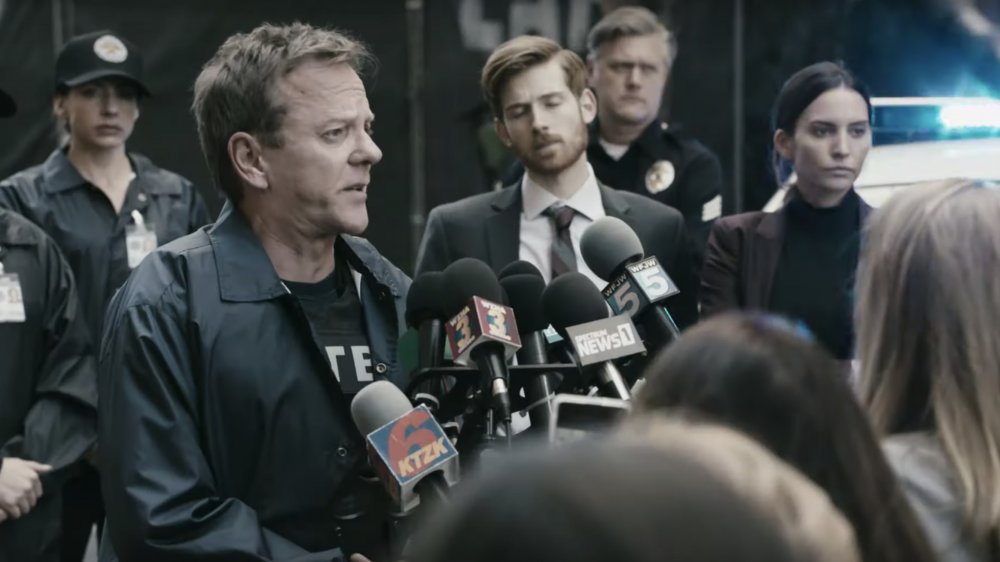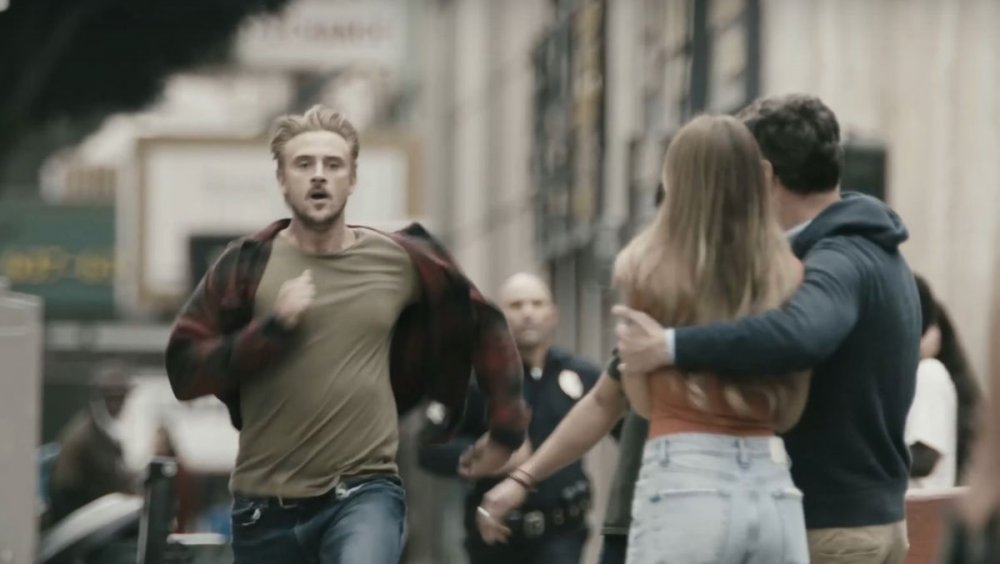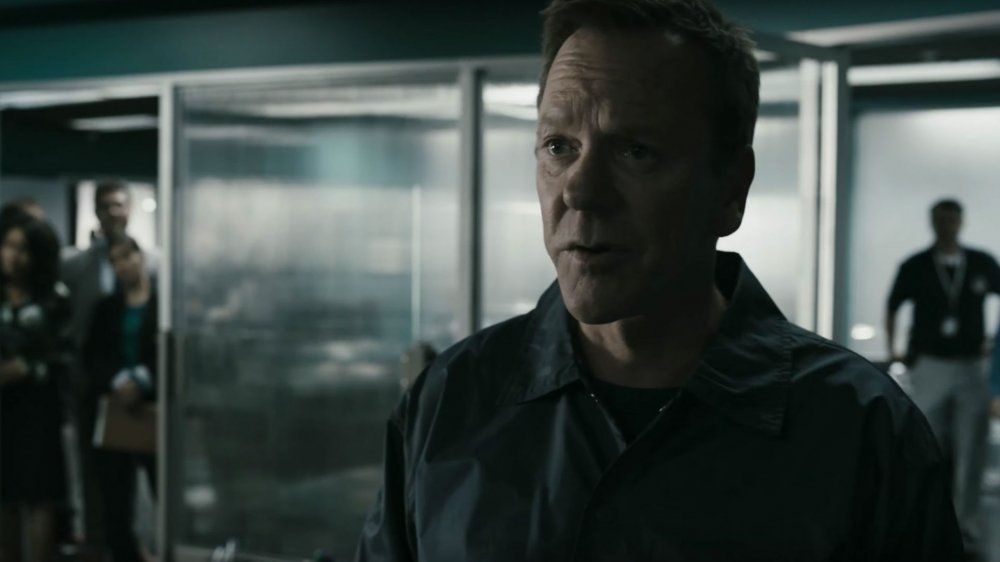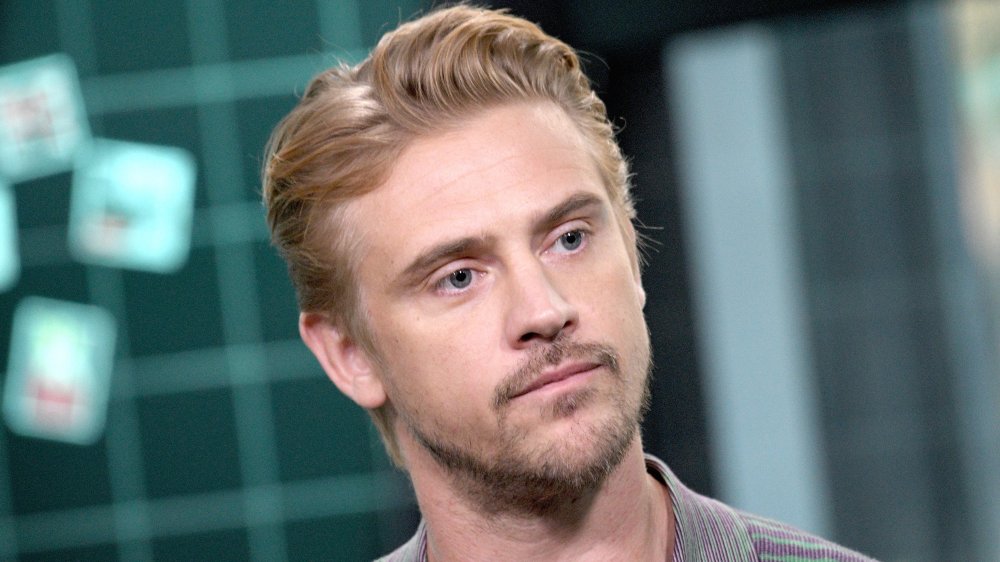The Difference Between Quibi's The Fugitive And The 1993 Movie
A solid cat-and-mouse thriller is perennially entertaining, and 1993's version of The Fugitive starring Harrison Ford and Tommy Lee Jones stands out as a classic that built upon the reputation of the '60s TV series on which it was based. Quibi is looking to bring the story into the 21st century one episodic bite at a time, and will be releasing their version, which stars Kiefer Sutherland as Detective Clay Bryce and Boyd Holbrook as the maligned Mike Ferro, in June of 2020. This is no simple re-adaptation, as you can already tell from the new names — it's the same basic concept of a man unjustly accused of a crime on the run and hunted by tireless investigator, but promises all kinds of detail changes to freshen up the scenario for our contemporary age.
The Fugitive is, at heart, a very direct, simple narrative, and therefore highly flexible. The casting of Sutherland — most famous for himself being a man eternally on the run in 24 – already lends a particular flavor to what we might expect, but the inclusion of erstwhile 24 director and producer Stephen Hopkins only adds to it. Quibi's programming format is based on five-to-ten-minute episodes, so any alumni of 24, on which the narrative only depicted one hour at a time, seems a perfect fit for the new streaming platform. Here are the major differences from the classic film you can expect of this reinvention.
Quibi's The Fugitive modernizes the context
You can't update a story today without the acknowledgement of the incredible generational effect the Internet and, more specifically, social media has created in our lives, and naturally The Fugitive will be incorporating that into its story. The official series summary describes it thusly: "[f]aulty evidence on the ground and 'tweet-now, confirm-later' journalism paint a nightmarish picture: it looks to all the world that Mike was responsible for the heinous act. Wrongfully — and very publicly — accused, Mike must prove his innocence by uncovering the real perpetrator".
Social media will definitely be the source of at least a few plot twists as Ferro tries to escape and prove his innocence; we can only begin to imagine the complications created by the general public's constant access to a smartphone camera. It also adds a new layer of terror that couldn't be felt in the 1993, when information was generally only disseminated through nightly newscasts and daily newspapers. We only see Det. Bryce's press conference in the trailer proclaiming Ferro as the suspect, but we are led to wonder just how much overzealous citizen journalism and hashtag culture play into the accusation.
Quibi's The Fugitive features a different precipitating event
We all can recall the crime at the center of Dr. Kimble's life in the 1993 version of The Fugitive: The murder of his wife by the infamous one-armed man. There's a corporate pharmaceutical twist when it turns out that Kimble was targeted by another doctor attempting to win FDA approval of a drug, but none of that is going to play into Quibi's version. This modern take lives in the post-Boston Marathon bombing world, and appears to be operating somewhat close to those terrorism-centric grounds. A bombing on LA public transit is the event at the heart of this story, though the trailer naturally doesn't get into who is really responsible for this seeming act of terror. Sutherland's character is shown in that trailer saying that Ferro is "their one and only suspect". That's to be expected, of course, since that's where the conflict in all the versions of The Fugitive come from, but this isn't a simple domestic murder gone awry — these characters might have a pre-established history yet to be revealed.
Quibi's The Fugitive has a protagonist with a different background
The trailer for the series released in February is fast-paced and short, but the keen-eared will catch a flash of dialogue that is illuminating: Ferro explains in voiceover that he will not go back to prison for something he didn't do. There's no context given, but apparently our protagonist will be a convicted felon of some stripe. Ford's Dr. Kimble was a celebrated medical practitioner accused out of the blue of murder based on circumstantial evidence. He'd never been in trouble in his life before his death-defying swan dive out of sa ewer pipe.
The dialogue also leaves it a bit fuzzy as to how justified Ferro's status as a felon is. Was he already put in prison once unjustly, or is he simply a reformed criminal? Does he already know Det. Bryce, who may have arrested him before? Part of the story will encompass the modern jury-by-social-media, so perhaps we can expect that a choice bit of doxxing on Ferro's criminal record automatically paints him as the only possible suspect. In the '93 film, it ended up being a professional colleague that attempted to frame Dr. Kimble; perhaps. in this day and age, the ultimately guilty party is connected back to Ferro's less-than-legal background and out on a vendetta. It makes for all kinds of juicy possibilities, and we can't wait to see how it unfolds.



